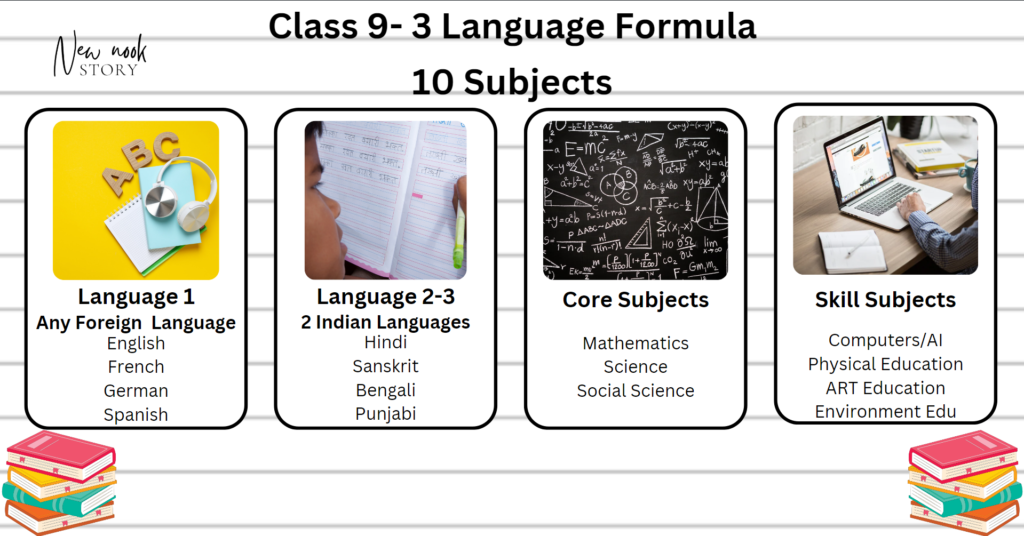The National Education Policy (NEP) came into existence in 2020. It is a document available on the CBSE site, and it is relevant to take a detailed look at this informative document. According to the National Curriculum Framework (NCF), CBSE has been diligently working on new educational policies, striving to modify the education system for its betterment. Today, in this article, I aim to highlight the major changes that CBSE has decided upon, which are going to reshape the landscape of our education system.
CHANGE IN TEXTBOOKS
CBSE aims to update the textbooks for all grades, but it is finding it challenging to manage the necessary means and resources to change them all at once. Initially, it was stated that new textbooks would be published based on NEP 2020 for grades 1, 6, and 9, but recently, NCERT has informed CBSE that new textbooks and syllabi only for classes 3 and 6 will be released soon for sessions 2024-25. Subsequently, new versions of textbooks will be released later for the other grades as well. Although the PDFs of the new versions for the mentioned grades have not been received yet, they will be available soon.
NO DETENTION POLICY REMOVED
The no-detention policy adopted by CBSE aimed at creating a stress-free environment for the students. However, it did not tend to be very successful, as some children, especially in rural areas, who didn’t even know basic reading and writing, could pass all the classes. This, in turn, created a massive problem for the children themselves.
NEW CRITERIA:
Under the new policy, a child in class 5 and 8 may face detention if they fail to meet the following criteria:
- Achieve a minimum of 25% in theory exams separately.
- Maintain a minimum attendance of 75%.
However, the principal of the school has the authority to review medical cases and may grant exemptions up to a maximum of 10%.
CBSE BOARD EXAMS FOR CLASS 10 & 12
The first attempt at the board exam will take place in Nov-Dec, and the second attempt will be held in Feb- March.
Both exams will cover the full syllabus and not the half-yearly syllabus. There will be no provisions for compartment exams after the first set of board exams. Also, the regular classes will take place after the first set board exam. The 2 board exam pattern will be followed from 2025.
Note: To know in detail about the board exam, refer to the following link :
3 LANGUAGE FORMULA FOR CLASS 9
10 subjects in total:
The NEP 2020 aims to emphasize Indian-origin languages over foreign languages. The future of learning foreign languages looks bleak, as the focus will be more on Indian languages. The core subjects will include Mathematics, Science, and Social science. Also, the skill subjects will include Computers/AI, Physical Education, Art Education, and Environmental Education will hold equal importance as the core subjects. The following picture will provide a clear idea of the choice of languages one can decide upon.

Class 11 subjects will be as follows:
STREAMS
In grade 11, children will not be restricted to adopting a particular stream, such as science, commerce, or arts; rather, they are free to choose any combinations according to their future career requirements.
NATIONAL CREDIT FRAMEWORK( NCrF)
One of the most distinctive introductions is the National Credit Framework. According to the framework, an academic year will be defined by the number of hours a student puts in, and credits will be provided to them at the end of each academic year.
The key point of NCrF
- One hundred twenty hours/periods have been allotted to each of the three languages as well as to the Interdisciplinary Areas (Environmental Education).
- One hundred fifty hours/periods each has been allotted to Mathematics & Computational Thinking, Social Science, Science, and Vocational Education.
- Sixty hours/periods each have been allotted to Art Education and Physical Education & Wellbeing.
By hours, it encompasses not only the school period but also study time allocated for assignments, tests, and homework in addition to class hours. The students will be awarded either zero or 40 credits depending on whether they fail or pass the subject. For every 30 learning hours, 1 credit is awarded. Applying the same math, an academic year with 1200 National learning hours will give 40 credits to each student.
DIGILOCKER
The DigiLocker was previously used to store important documents such as certificates and mark sheets, but now it will play the most significant role, as the credits earned each year by a student will be deposited in the Academic Bank of Credit, which is linked to their DigiLocker. The mentioned system is not limited to school years; instead, it will continue through graduation, post-graduation, and PhD studies.
Initially, the credit system introduced by CBSE may seem complicated, but understanding its deep relevance reveals how it aids individuals. If anyone decides to take a break, they will have the opportunity to resume from where they left off according to their credit score.
CONCLUSION
CBSE is actively involved in formulating a list of new initiatives and spearheading efforts to reshape the education system in line with NEP 2020. While some changes announced by CBSE will require time to implement, the planning process is set to commence from the current academic session. Staying well-versed and updated with these changes is crucial.